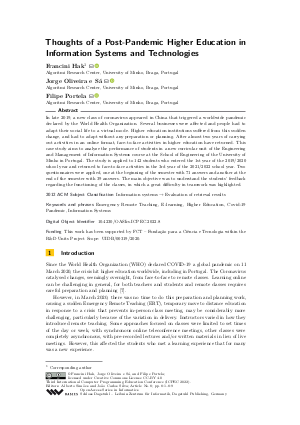Thoughts of a Post-Pandemic Higher Education in Information Systems and Technologies
Authors
Francini Hak  ,
Jorge Oliveira e Sá
,
Jorge Oliveira e Sá  ,
Filipe Portela
,
Filipe Portela 
-
Part of:
Volume:
Third International Computer Programming Education Conference (ICPEC 2022)
Part of: Series: Open Access Series in Informatics (OASIcs)
Part of: Conference: International Computer Programming Education Conference (ICPEC) - License:
 Creative Commons Attribution 4.0 International license
Creative Commons Attribution 4.0 International license
- Publication Date: 2022-07-11
File

PDF
OASIcs.ICPEC.2022.8.pdf
- Filesize: 498 kB
- 9 pages
Document Identifiers
Subject Classification
ACM Subject Classification
- Information systems → Evaluation of retrieval results
Keywords
- Emergency Remote Teaching
- E-learning
- Higher Education
- Covid-19 Pandemic
- Information Systems
Metrics
- Access Statistics
-
Total Accesses (updated on a weekly basis)
0Document
0Metadata
Abstract
In late 2019, a new class of coronavirus appeared in China that triggered a worldwide pandemic declared by the World Health Organization. Several businesses were affected and people had to adapt their social life to a virtual mode. Higher education institutions suffered from this sudden change, and had to adapt without any preparation or planning. After almost two years of carrying out activities in an online format, face-to-face activities in higher education have returned. This case study aims to analyze the performance of students in a new curricular unit of the Engineering and Management of Information Systems course at the School of Engineering of the University of Minho in Portugal. The study is applied to 142 students who entered the 1st year of the 2019/2020 school year and returned to face-to-face activities in the 3rd year of the 2021/2022 school year. Two questionnaires were applied, one at the beginning of the semester with 71 answers and another at the end of the semester with 39 answers. The main objective was to understand the students' feedback regarding the functioning of the classes, in which a great difficulty in teamwork was highlighted.
Cite As Get BibTex
Francini Hak, Jorge Oliveira e Sá, and Filipe Portela. Thoughts of a Post-Pandemic Higher Education in Information Systems and Technologies. In Third International Computer Programming Education Conference (ICPEC 2022). Open Access Series in Informatics (OASIcs), Volume 102, pp. 8:1-8:9, Schloss Dagstuhl – Leibniz-Zentrum für Informatik (2022)
https://doi.org/10.4230/OASIcs.ICPEC.2022.8
BibTex
@InProceedings{hak_et_al:OASIcs.ICPEC.2022.8,
author = {Hak, Francini and Oliveira e S\'{a}, Jorge and Portela, Filipe},
title = {{Thoughts of a Post-Pandemic Higher Education in Information Systems and Technologies}},
booktitle = {Third International Computer Programming Education Conference (ICPEC 2022)},
pages = {8:1--8:9},
series = {Open Access Series in Informatics (OASIcs)},
ISBN = {978-3-95977-229-7},
ISSN = {2190-6807},
year = {2022},
volume = {102},
editor = {Sim\~{o}es, Alberto and Silva, Jo\~{a}o Carlos},
publisher = {Schloss Dagstuhl -- Leibniz-Zentrum f{\"u}r Informatik},
address = {Dagstuhl, Germany},
URL = {https://drops.dagstuhl.de/entities/document/10.4230/OASIcs.ICPEC.2022.8},
URN = {urn:nbn:de:0030-drops-166122},
doi = {10.4230/OASIcs.ICPEC.2022.8},
annote = {Keywords: Emergency Remote Teaching, E-learning, Higher Education, Covid-19 Pandemic, Information Systems}
}
Author Details
Funding
This work has been supported by FCT – Fundação para a Ciência e Tecnologia within the R&D Units Project Scope: UIDB/00319/2020.
References
- Tianhua Chen and Mike Lucock. The mental health of university students during the covid-19 pandemic: An online survey in the uk. PLoS ONE, 17, 2022. URL: https://doi.org/10.1371/journal.pone.0262562.
- Kristen Fox, Gates Bryant, Nicole Lin, and Nandini Srinivasan. Time for class covid-19 edition: part 1: a national survey of faculty during covid-19 | vocedplus, the international tertiary education and research database. Tyton Partners and Every Learner Everywhere, 2020. URL: https://www.voced.edu.au/content/ngv:88359.
- Regan A. R. Gurung and Arianna M. Stone. You can’t always get what you want and it hurts: Learning during the pandemic. Scholarship of Teaching and Learning in Psychology, October 2020. URL: https://doi.org/10.1037/STL0000236.
- Madona Kekelia, Eliso Kereselidze, and Ina Shanava. The covid-19 pandemic and the mental health of students. Vectors of Social Sciences, 1, 2021. URL: https://jlaw.tsu.ge/index.php/vss/article/view/3639.
- Barbara Means and Julie Neisler. Suddenly online: A national survey of undergraduates during the covid-19 pandemic, July 2020. URL: https://doi.org/10.51388/20.500.12265/98.
- Madeleine Pownall, Richard Harris, and Pam Blundell-Birtill. Supporting students during the transition to university in covid-19: Five key considerations and recommendations for educators:. Psychology Learning & Teaching, 21:3-18, July 2021. URL: https://doi.org/10.1177/14757257211032486.
-
Shannon Riggs, Kathryn E. Linder, and Penny Ralston-Berg. Thrive online: a new approach to building expertise and confidence as an online educator. STYLUS PUB LLC, 2019.

- Katerina Salta, Katerina Paschalidou, Maria Tsetseri, and Dionysios Koulougliotis. Students’ engagement and interactions in four university-based science learning communities during a shift from a traditional to a distance learning environment imposed by the covid-19 pandemic. Science & Education, 31:93-122, 2022. URL: https://doi.org/10.1007/s11191-021-00234-x.
- Klaus Zierer. Effects of pandemic-related school closures on pupils’ performance and learning in selected countries: A rapid review. Education Sciences, 11:252, May 2021. URL: https://doi.org/10.3390/EDUCSCI11060252.
